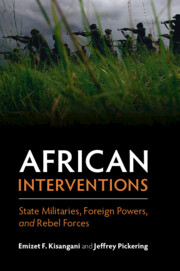Book contents
- African Interventions
- African Interventions
- Copyright page
- Dedication
- Contents
- Figures
- Tables
- Acknowledgments
- Abbreviations
- 1 Context and Issues of International Military Intervention
- 2 Non-colonial Military Interventions in Africa
- 3 Military Intervention by Former Colonial Powers in Africa
- 4 Intra-African Hostile Military Intervention
- 5 Intra-African Supportive Military Intervention
- 6 African Intervention into Failed States
- Conclusion
- Appendices
- Notes
- References
- Index
1 - Context and Issues of International Military Intervention
Published online by Cambridge University Press: 29 October 2021
- African Interventions
- African Interventions
- Copyright page
- Dedication
- Contents
- Figures
- Tables
- Acknowledgments
- Abbreviations
- 1 Context and Issues of International Military Intervention
- 2 Non-colonial Military Interventions in Africa
- 3 Military Intervention by Former Colonial Powers in Africa
- 4 Intra-African Hostile Military Intervention
- 5 Intra-African Supportive Military Intervention
- 6 African Intervention into Failed States
- Conclusion
- Appendices
- Notes
- References
- Index
Summary
Chapter 1 provides the rationale and the context for the book while also highlighting the novelty of the study. Existing research in international relations and African politics has yet to provide a thorough analysis of military intervention into or within Africa. This initial chapter discusses the utility of studying the continent as a whole (rather than sub-Saharan Africa alone), defines terms, and offers basic data on intervention patterns in Africa. It then presents the book’s theoretical framework, which is built upon three components: diversionary theory (domestic level), rebel movement theory (transnational level), and role theory (international level). The chapter continues by outlining the three research methods used to explain intervention in Africa and to evaluate the utility of the theory: quantitative analysis, historical narrative, and qualitative comparative analysis (QCA). It explains the benefits of triangulation across the three methods and how this offers a more comprehensive understanding of African intervention. The chapter then analyzes a large N quantitative results that offer a foundation for more detailed historical and qualitative work in later chapters. As further preparation for the qualitative chapters to come, it provides details on the QCA approach before outlining the remaining chapters in the book.
Keywords
- Type
- Chapter
- Information
- African InterventionsState Militaries, Foreign Powers, and Rebel Forces, pp. 1 - 48Publisher: Cambridge University PressPrint publication year: 2021



